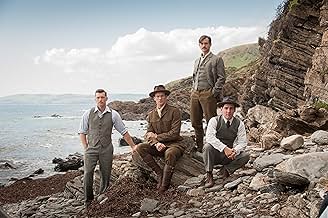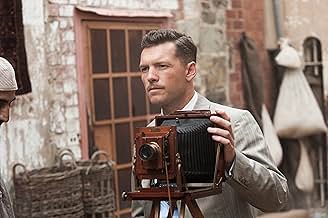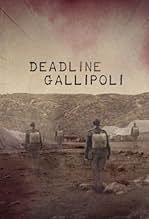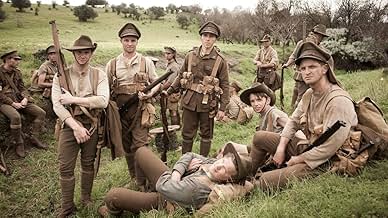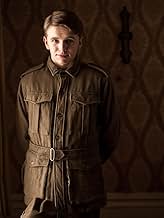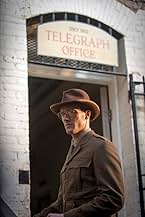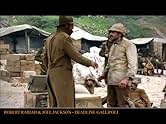Esta es la historia de los hombres que no serán silenciados. Las acciones de estos hombres ayudarán a cambiar el curso de la batalla, harán que una catástrofe estratégica se convierta en una... Leer todoEsta es la historia de los hombres que no serán silenciados. Las acciones de estos hombres ayudarán a cambiar el curso de la batalla, harán que una catástrofe estratégica se convierta en una leyenda del heroísmo.Esta es la historia de los hombres que no serán silenciados. Las acciones de estos hombres ayudarán a cambiar el curso de la batalla, harán que una catástrofe estratégica se convierta en una leyenda del heroísmo.
- Premios
- 5 premios ganados y 10 nominaciones en total
Explorar episodios
Argumento
¿Sabías que…?
- TriviaThis television mini-series was "filmed in South Australia across nine weeks".
- ErroresAs a result of an injury at the Battle of Majuba in the First Boer War (1881), Sir Ian Hamilton was unable to use his left hand. Here he shown using cutlery, dressing etc without any problem.
- ConexionesFeatured in Deadline Gallipoli: The Full Story (2015)
Opinión destacada
Not long before "Deadline Gallipoli" was shown on TV, a panel of entertainment reviewers commented on how Australians were getting Gallipoli'd out as we approached the 100th anniversary of the landing.
They discussed the avalanche of documentaries, special features and media events commemorating the event. They felt that overkill was the main reason the recent, big budget mini-series, "Gallipoli", had not rated well. However, they had high hopes for this two-part series, which covered the war correspondent's role in the campaign. Was such optimism justified?
For the most part the answer is yes, but with reservations in a few areas.
The story covers the attempts of four correspondents to report the Gallipoli campaign: Englishman, Ellis Ashmead Bartlett (Hugh Dancy), and Australians, Charles Bean (Joel Jackson), Phillip Schuler (Sam Worthington) and Keith Murdoch (Ewan Leslie). The series gives a fascinating insight into the way the military hierarchy tried to censor every report mainly to cover their own shortcomings.
The film's strength is in the believable, sometimes witty exchanges between the characters, which lets us know what is happening without resorting to narration. The script, and a well-chosen cast define the characters of the men involved: the more rebellious Bartlett, Schuler and Murdoch against the somewhat straight-laced and studious Bean. It takes a good script to hold the attention through the intrigues of that 100-year old campaign, but "Deadline Gallipoli" is full of tension.
Where it suffers is in depictions of the campaign, it seems the budget could only stretch so far. For example, the advance of three thousand Australians across the flat plain at Krithia is represented here by a couple of dozen extras scampering around on a hillside. For the most part, the major complaint about the recreations is lack of scale rather than outright distortion, but the Charge at the Nek is a different matter.
This must be put down to a brain snap on the part of the filmmakers. Only masochists would run the risk of such a weak offering being compared with Peter Weir's masterful recreation of the event in 1981's "Gallipoli". It's almost as though the rigorous research that informed the rest of the production simply didn't take place here.
Charles Bean was not in the front line at the Nek during the charge nor was 'Push on' Antill. As for the latter threatening to shoot men who would not climb out is something I haven't read in any of Charles Bean's accounts or in John Hamilton's well-researched, "Goodbye Cobber, God Bless You". It's a pity that this strange scene was included in a drama, which has as its central theme the honest and accurate reporting of history.
With that said, "Deadline Gallipoli" is probably the best of the current crop of mini-series and recreations about Gallipoli. It brings to life with a degree of intelligence, men who made an impact on the times they lived in and shaped history as we know it.
They discussed the avalanche of documentaries, special features and media events commemorating the event. They felt that overkill was the main reason the recent, big budget mini-series, "Gallipoli", had not rated well. However, they had high hopes for this two-part series, which covered the war correspondent's role in the campaign. Was such optimism justified?
For the most part the answer is yes, but with reservations in a few areas.
The story covers the attempts of four correspondents to report the Gallipoli campaign: Englishman, Ellis Ashmead Bartlett (Hugh Dancy), and Australians, Charles Bean (Joel Jackson), Phillip Schuler (Sam Worthington) and Keith Murdoch (Ewan Leslie). The series gives a fascinating insight into the way the military hierarchy tried to censor every report mainly to cover their own shortcomings.
The film's strength is in the believable, sometimes witty exchanges between the characters, which lets us know what is happening without resorting to narration. The script, and a well-chosen cast define the characters of the men involved: the more rebellious Bartlett, Schuler and Murdoch against the somewhat straight-laced and studious Bean. It takes a good script to hold the attention through the intrigues of that 100-year old campaign, but "Deadline Gallipoli" is full of tension.
Where it suffers is in depictions of the campaign, it seems the budget could only stretch so far. For example, the advance of three thousand Australians across the flat plain at Krithia is represented here by a couple of dozen extras scampering around on a hillside. For the most part, the major complaint about the recreations is lack of scale rather than outright distortion, but the Charge at the Nek is a different matter.
This must be put down to a brain snap on the part of the filmmakers. Only masochists would run the risk of such a weak offering being compared with Peter Weir's masterful recreation of the event in 1981's "Gallipoli". It's almost as though the rigorous research that informed the rest of the production simply didn't take place here.
Charles Bean was not in the front line at the Nek during the charge nor was 'Push on' Antill. As for the latter threatening to shoot men who would not climb out is something I haven't read in any of Charles Bean's accounts or in John Hamilton's well-researched, "Goodbye Cobber, God Bless You". It's a pity that this strange scene was included in a drama, which has as its central theme the honest and accurate reporting of history.
With that said, "Deadline Gallipoli" is probably the best of the current crop of mini-series and recreations about Gallipoli. It brings to life with a degree of intelligence, men who made an impact on the times they lived in and shaped history as we know it.
- tomsview
- 15 may 2015
- Enlace permanente
Selecciones populares
Inicia sesión para calificar y agrega a la lista de videos para obtener recomendaciones personalizadas
Detalles
- Fecha de lanzamiento
- País de origen
- Sitios oficiales
- Idioma
- También se conoce como
- Галлиполийская история
- Locaciones de filmación
- Productoras
- Ver más créditos de la compañía en IMDbPro
- Tiempo de ejecución3 horas 17 minutos
- Color
Contribuir a esta página
Sugiere una edición o agrega el contenido que falta

Principales brechas de datos
By what name was Deadline Gallipoli (2015) officially released in Canada in English?
Responda

